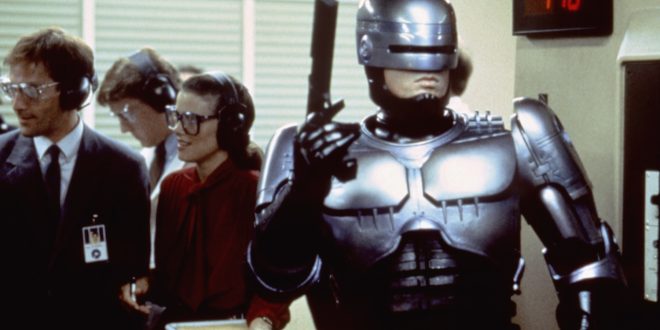Even Officer Alex Murphy’s last temptation is similar to Jesus Christ’s. It’s literally the same offer of restored humanity when Murphy, in the finale, reclaims who he is. Since he’s not actually the Son of God, Murphy gets to keep his renewed sense of self. Until the next movie when OCP’s legal department tries to beat it out of him.
Walking on Water
It’s easy to point at the climactic scene where RoboCop walks on water and laugh about the religious parallels. But the entire movie was deliberately crafted around that sight gag, from the previously mentioned crucifixion to RoboCop’s larger-than-life presence when tangling with his first few perps. The alley assault features one of the movie’s most striking shots where RoboCop’s massive shadow envelops two attempted rapists and their victim, growing even larger and more intimidating as he approaches. It’s so arresting that, as the RoboDoc documentary points out, the audience never notices that’s the reverse of how shadows work, and it helps create an inhuman mystique around the resurrected cyborg. We can also mutter something about the long shadow of Christianity during the Crusades here, and maybe that’s going too far with the parallels and Verhoeven’s jaded notion of faith… but maybe it isn’t.
To help Verhoeven’s thematic emphasis, RoboDoc makes it clear he was hands-on throughout much of the creative process—sometimes to the annoyance of the crew. According to one anecdote late in the documentary, Verhoeven’s obsessive antics ruined an entire day’s worth of heavy makeup when filming RoboCop’s helmet-less scenes with Officer Lewis (Nancy Allen) in the steel factory. But he’s also the one who insisted that the audience wouldn’t see Murphy’s human face again until he was on the cusp of remembering who he was. That even includes the softening of RoboCop’s modulated voice, until Weller’s rich, all-too-human tone returns to the foreground.
Yet Verhoeven’s conflicted ideas of faith still paint Murphy’s return with an equally human cynicism. Murphy has revived, but his memories remain lost. He’s a breathing ghost with a fragile tether to his humanity trapped in an inhuman shell, and it’s easy to suspect that, theologically, he no longer has all of his soul. It’s a kind of holy blasphemy, offering a backhanded resurrection to what had once been a good man. And that’s a Verhoeven speciality.
RoboCop of Nazareth
Paul Verhoeven is an amateur secular scholar of Christianity, and his particular interest is in the concept of Jesus as a charismatic human being after all of the supernatural trappings are stripped away. He’s written a book on the topic, , Jesus of Nazareth, released in 2007, and he’s been attempting to film those ideas since 2011. Besides the fact that this is a film that undoubtedly would go down as smoothly with the various fanatic and right wing ‘concern’ groups as smoothly as Martin Scorsese’s (still reverent) The Last Temptation of Christ did, it’s also hard to ignore that Verhoeven’s controversial but deeply thought discussions on faith haven been consistently present in most of his movies since his breakout film Turkish Delight (1973).
Turkish Delight is a monument to Verhoeven’s earthy ideas of sacrilege and sin in order to achieve a kind of immortality. Meanwhile 2021’s Benedetta drags us into a lurid but poignant discussion of sexuality as sacred, even in the face of profane tragedy. But sandwiched between these cinematic bookends, it’s RoboCop, a comic book styled movie with enough gore to pick a fight with the MPAA, but which is nonetheless Verhoeven’s intentional and funny Jesus movie.
#celeb #celebrity
